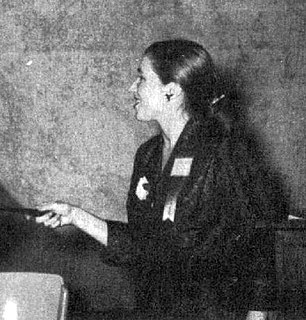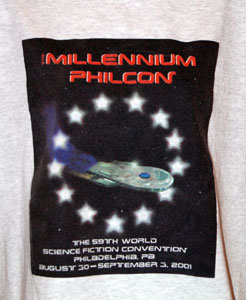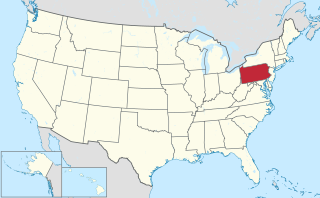
Science fiction fandom or SF fandom is a community or fandom of people interested in science fiction in contact with one another based upon that interest. SF fandom has a life of its own, but not much in the way of formal organization.
Worldcon, or more formally the World Science Fiction Convention, the annual convention of the World Science Fiction Society (WSFS), is a science fiction convention. It has been held each year since 1939. The members of each Worldcon are the members of WSFS, and vote both to select the site of the Worldcon two years later, and to select the winners of the annual Hugo Awards, which are presented at each convention.
WisCon or Wiscon, a Wisconsin science fiction convention, is the oldest, and often called the world's leading, feminist science fiction convention and conference. It was first held in Madison, Wisconsin in February 1977, after a group of fans attending the 1976 34th World Science Fiction Convention in Kansas City was inspired to organize a convention like WorldCon but with feminism as the dominant theme. The convention is held annually in May, during the four-day weekend of Memorial Day. Sponsored by the Society for the Furtherance and Study of Fantasy and Science Fiction, or (SF)³, WisCon gathers together fans, writers, editors, publishers, scholars, and artists to discuss science fiction and fantasy, with emphasis on issues of feminism, gender, race, and class.

The 10th World Science Fiction Convention was held on Labor Day weekend from August 30 to September 1, 1952, at the Morrison Hotel in Chicago, Illinois. This Worldcon never chose an official name other than the title "10th World Science Fiction Convention," as both the convention's issued membership card and program book clearly stated. Only the first Worldcon in New York City (1939) and the 11th in Philadelphia, 1953, shared this lack of a formal convention name. The phrases "Tenth Anniversary World Science Fiction Convention" (TAWSFiC) and "Tenth Anniversary Science Fiction Convention" were each used in some of this Worldcon's pre-convention materials; the phrase's acronyms "TAWSFiC" and "TASFiC" were never officially used in print or otherwise by the Chicago committee at that time. However, the 10th Worldcon was frequently referred to by its members by the unofficial name Chicon II, so dubbed after the previous Chicago Worldcon (Chicon) in 1940; this name proved so popular that the convention became known as Chicon II in science fiction fandom's lore and written histories.

The 11th World Science Fiction Convention, also known as Philcon II, was held in September 1953 at the Bellevue-Stratford Hotel in Philadelphia, Pennsylvania, USA. It was the first Worldcon to present the Hugo Awards. The supporting organization was the Philadelphia Science Fiction Society. The guest of honor was Willy Ley. The chairman was Milton A. Rothman, replacing the late James A. Williams. Isaac Asimov was toastmaster.
Bay Area Science Fiction Association (BASFA) is a science fiction fandom social club. The organization was founded after a committee meeting for the SiliCon science fiction convention in 1991 by several Bay Area convention organizers (SMOFs) looking for a reason to meet other than at committee meetings. The club has met weekly since 1991, at various locations in the southern portion of the San Francisco Bay Area.

VCON is a fan run fantasy, gaming, and science fiction convention held annually in the metro Vancouver area of British Columbia, Canada. It has been hosted by the West Coast Science Fiction Association (WCSFA) since 1993, and by the Western Canadian Science Fiction Convention Committee Association (WCSFCCA) before that.

The Millennium Philcon was the 59th World Science Fiction Convention, held from August 30 to September 3, 2001 at the Pennsylvania Convention Center & Philadelphia Marriott Hotel in Philadelphia, Pennsylvania, USA.
The 21st World Science Fiction Convention, also known as Discon I, was held August 31–September 2, 1963, at the Statler-Hilton Hotel in Washington, D.C., United States.

Bruce Gillespie is a prominent Australian science fiction fan best known for his long-running sf fanzine SF Commentary. Along with Carey Handfield and Rob Gerrand, he was a founding editor of Norstrilia Press, which published Greg Egan's first novel.
The Hugo Awards are presented every year by the World Science Fiction Society for the best science fiction or fantasy works and achievements of the previous year. The award is named after Hugo Gernsback, the founder of the pioneering science fiction magazine Amazing Stories, and was once officially known as the Science Fiction Achievement Award. The award has been described as "a fine showcase for speculative fiction" and "the best known literary award for science fiction writing". In addition to the regular awards that have been given in most years that the awards have been active, several discontinued Hugo Awards have been presented throughout the years, only to be removed after a few years.
Richard H.E. Smith II is a Chicago, Illinois- and Milwaukee, Wisconsin-based software engineer, computer consultant and a science fiction fanzine publisher.

The Orange County Science Fiction Club (OCSFC), founded in 1982, is a public club which meets in Orange County, California, and is one of the oldest continuing science fiction and fantasy organizations in Orange County. Membership is open to anyone in the community and includes published authors and actors. The club has also helped organize book signing events of well-known authors and has assisted in organizing local science fiction conventions.
The Ditmar Award has been awarded annually since 1969 at the Australian National Science Fiction Convention to recognise achievement in Australian science fiction and science fiction fandom. The award is similar to the Hugo Award but on a national rather than international scale.
Peggy Rae Sapienza,, was a second generation science fiction fan and a consummate con-runner and promoter of science fiction fandom. She made memorable contributions to Noreascon III in Boston, the 1989 Worldcon, partnering with Fred Isaacs in conceptualizing the ConCourse, a new feature for Worldcons. A Vice Chair of the 1993 Worldcon, ConFrancisco, she served briefly as Acting Chair after the Chairman died, until a new Chairman was appointed. In 1998 she chaired BucConeer, the 56th Worldcon in Baltimore. She served as North American agent for the first Worldcon to be held in Japan, Nippon 2007; in 2010 co-chaired, and 2011 and 2012 chaired the SFWA Nebula Awards Weekends; and was Fan Guest of Honor at Chicon 7, the 70th Worldcon, held in 2012. She co-chaired the 2014 World Fantasy Convention just months before she died due to complications from heart surgery.












